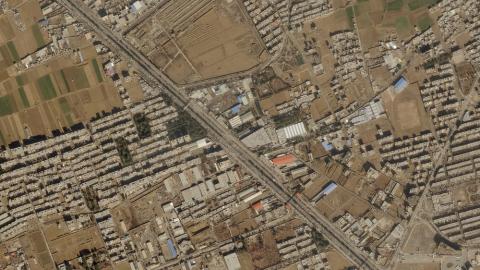
In 2010, the Stuxnet computer virus, widely believed to have been developed by the US and Israel, was discovered after it was used to attack Natanz
JERUSALEM: Israel’s defense minister said on Sunday it is not “necessarily” behind every mysterious incident in Iran, after a fire at the Natanz nuclear site prompted some Iranian officials to say it was the result of cyber sabotage.
Israel, widely believed to be the region’s only nuclear power, has pledged never to allow Iran to obtain atomic weapons, saying Tehran advocates its destruction. Iran denies ever seeking nuclear arms and says its atomic program is peaceful.
The underground Natanz site, where a one-story building was partly burned on Thursday, is the centerpiece of Iran’s uranium enrichment program and monitored by inspectors of the International Atomic Energy Agency, the UN nuclear watchdog.
Asked whether Israel had anything to do with “mysterious explosions” at Iranian nuclear sites, Israeli Defense Minister Benny Gantz said: “Not every incident that transpires in Iran necessarily has something to do with us.”
“All those systems are complex, they have very high safety constraints and I’m not sure they always know how to maintain them,” Gantz told Israel Radio.
Three Iranian officials who spoke to Reuters said they thought cyber sabotage had been involved at Natanz, but offered no evidence. Two said Israel could have been behind it.
An article by Iran’s state news agency IRNA addressed what it called the possibility of sabotage by enemies such as Israel and the US, although it stopped short of accusing either directly.
In 2010, the Stuxnet computer virus, widely believed to have been developed by the US and Israel, was discovered after it was used to attack Natanz.
Last month, Israeli Security Cabinet Minister Zeev Elkin said Iran had attempted to mount a cyberattack on Israel’s water system in April.
Iran curbed its nuclear work in exchange for removal of most global sanctions under a 2015 accord with six world powers. It has reduced compliance since the US withdrew in 2018.
A fire broke out at a power station in southwestern Iran on Saturday, the latest in a string of fires and explosions, some of which have hit sensitive sites.
The blaze, which affected a transformer in the power station in the city of Ahvaz, was put out by firefighters and electricity was restored after partial outages, Mostafa Rajabi Mashhadi, a spokesman for state-run power company TAVANIR, told the semi-official news agency Tasnim.
There have been several other incidents at facilities across the country recently.
A chlorine gas leak occurred at a unit of the Karoon petrochemicals plant near the port of Bandar Imam Khomeini on the Gulf, the Iranian Oil Ministry’s SHANA news agency reported.
“Some employees who were present near the unit suffered minor injuries (because of chlorine inhalation),” the plant’s director told SHANA, adding that the leak was stopped. A fire broke out at Iran’s Natanz nuclear facility on Thursday, but officials said operations were not affected.
A former official suggested the incident could have been an attempt to sabotage work at the plant, which has been involved in activities that breach an international nuclear deal.
On Tuesday, 19 people were killed in an explosion at a medical clinic in the north of the capital Tehran, which an official said was caused by a gas leak.
On June 26, an explosion occurred east of Tehran near the Parchin military and weapons development base that the authorities said was caused by a leak in a gas storage facility in an area outside the base.











